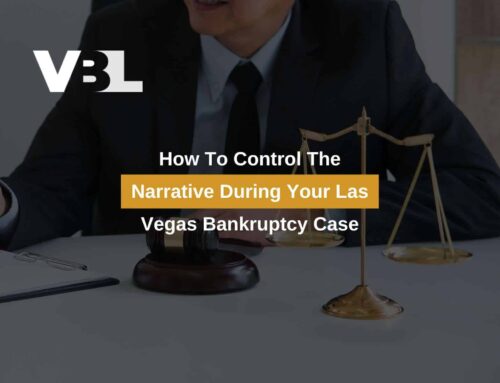Should I Use An Offer In Compromise Or Bankruptcy?
Offer In Compromise Vs. Filing For Bankruptcy: Which Is Better If I’m Struggling With Debt In Nevada?
Struggling with debt is a stressful experience. Deciding which bills to pay, racking up late fees and interest, and always ignoring calls from unknown numbers may be facts of your life. It doesn’t have to be that way forever. You may have several methods of debt relief available to you. Read on to learn more about offers in compromise and the different chapters of bankruptcy, and contact us for your free consultation when you’re ready to get started.

What Is An Offer In Compromise?
An Offer in Compromise is a way to settle your tax debts with the IRS. Based on your financial situation, the IRS may accept an offer for just a fraction of your full balance. Because tax debts can expire, the IRS may actually have an interest in accepting partial payment, as you may not be able to pay before the debt expires. This could save you several thousands of dollars, depending on how much you owe.
What Is Bankruptcy?
Bankruptcy allows those struggling with debt to discharge it in a manner appropriate with their income, and with supervision by a government attorney. The debtor must file a petition, take credit counseling courses, and attend a hearing known as a 341 Meeting of Creditors as part of the bankruptcy process. The debtor will be protected from creditors by the Automatic Stay once the bankruptcy petition is filed, and until the case is discharged or dismissed. There are two main types of consumer bankruptcy- Chapter 7 and Chapter 13. Each has its own benefits and drawbacks, as well as eligibility criteria and other requirements.
What Is Chapter 7 Bankruptcy?
Chapter 7 bankruptcy is the most common type of consumer bankruptcy, and is the type that comes to mind when most people think of bankruptcy. Chapter 7 wipes away most types of unsecured debts, like credit cards, medical bills, and personal loans. This process is generally completed within 4-6 months of filing. However, property and income disqualify many people from filing Chapter 7 bankruptcy. Contact a Las Vegas bankruptcy attorney if you need help determining if you qualify for Chapter 7.
What Is Chapter 13 Bankruptcy?
Chapter 13 is sometimes called a wage earner’s bankruptcy. It reorganizes debts into a payment plan based on what the filer can afford to pay each month. The payment plan will last 3 or 5 years, depending on how the filer’s income compares to the state median. Some unsecured debts may be discharged in Chapter 13 without full repayment. It also allows the filer time to catch up on payments on assets like a house or vehicle while protected from repossession. For an estimate on your monthly plan payments in a Chapter 13, contact a Vegas Chapter 13 bankruptcy attorney for more information.
When Should I Pick An Offer In Compromise Over Filing Bankruptcy?
An Offer in Compromise may serve you best when the majority of your debt is to the IRS. One thing to keep in mind is whether your tax debt is dischargeable in bankruptcy. There are certain factors that must be met for taxes to be discharged in bankruptcy. The debt must be at least 3 years old, and for returns filed at least 2 years ago. The debts should have been assessed at least 240 days prior to filing bankruptcy. Lastly, any fraud will disqualify tax debts from dischargeability in bankruptcy. If your debts are dischargeable in bankruptcy and you have other debt, bankruptcy may be a more efficient way to remediate your debt problem.
When Should I Pick Chapter 7 Bankruptcy Over An Offer In Compromise?
Chapter 7 Bankruptcy offers tremendous benefits. Because it can clear so much debt, many people file Chapter 7 after a medical emergency, divorce, and other financially trying times. Tax debts that meet the requirements described above can also be discharged in Chapter 7. If your debts are dischargeable in Chapter 7 and you are eligible to file, it may be a great option for you. However, Chapter 7 isn’t available to everyone, and doesn’t come without its drawbacks.
What disqualifies most people from Chapter 7 bankruptcy is income. You must prove you meet the income standards for Chapter 7 bankruptcy through one of two ways. The first is by comparing your income to the median income in your state, based on your number of family members. If you aren’t paid by salary, you will use your average income over the past 6 months. Anyone who falls under the state median line will qualify for Chapter 7 bankruptcy. Otherwise, they will need to qualify using the Means Test.
To conduct the Means Test, you must first calculate your average monthly income using your income from the last 6 months. Then, you will subtract certain mandatory expenses from your average monthly income. The number you find is called your disposable monthly income. If this number is negative, or falls within a certain range based on family size, you will qualify for Chapter 7.
Another issue that keeps people from filing Chapter 7 is property exemptions. Your assets must be protected by exemptions in Chapter 7, or the trustee can seize them to sell and pay your creditors. Contact a bankruptcy attorney to check if all of your assets will be protected in Chapter 7.
When Should I Pick Chapter 13 Bankruptcy Over An Offer In Compromise?
Sometimes, Chapter 7 Bankruptcy may not be an option for you. Maybe your income is too high, or you have a non-exempt vehicle or house you want to keep. If you are behind on payments for these assets, Chapter 13 will actually make catching up more feasible. Your balance in arrears will be spread out over 3-5 years, and you will be protected from foreclosure and repossession while you remain current on your plan payments. Chapter 13 may also be preferable if you have co-signers on your loans who would be held liable if you declared Chapter 7. Chapter 13 also has special benefits that Chapter 7 doesn’t offer, like discharging junior liens on your home. If you are deciding between bankruptcy chapters, contact an attorney for guidance.
Does It Ever Make Sense To Use Both? (Bankruptcy & An Offer In Compromise)
For some people, it may make sense to use an offer in compromise after discharging debts in bankruptcy. If their tax debts weren’t dischargeable in bankruptcy, it can still make sense to address other debts first while under the protection of the Automatic Stay. A bankruptcy attorney will help you determine if you need both of these forms of debt relief for your financial situation.
Don’t Wait! Schedule Your Free Debt Evaluation In Las Vegas Today
Are you in a situation where debt from taxes and other circumstances have got you in a position that you need assistance? If so, call our Las Vegas Bankruptcy Attorneys today. Our attorney, Erik Severino, has filed thousands of successful bankruptcies in Las Vegas, Henderson, and throughout Clark County, Nevada. When dealing with multiple issues causing you debt, it is always best to have an experienced Nevada debt relief attorney working with you to get you a “Fresh Start”.
Do you still need help deciding between an offer in compromise or filing bankruptcy? Our experienced bankruptcy lawyers are standing by to assist you in this decision with your FREE consultation! We offer expert representation with payment plans that work with your budget- you may qualify to be filed for $0 down. Call or use our online form to get started with your free consultation today.
About Attorney Erik Severino, Las Vegas Bankruptcy Attorney
Mr. Severino has his expertise and focus in bankruptcy law practice and consumer law related matters. In 2009, he established his own law firm. Mr. Severino has experience assisting clients with legal debt help in Nevada. Thus, since the housing market decline, pandemic layoffs, and poor economy, Mr. Severino has worked to get many people in Nevada a “Fresh Start” though assisting residents, couples, and businesses with Chapter 7 and Chapter 13 bankruptcy filings. If you are seeking any form of debt relief in Nevada or Clark County, contact Erik today. CALL TODAY: 702-370-0155.

Las Vegas Bankruptcy Lawyers
LAS VEGAS
7251 W Lake Mead BLVD #300
Las Vegas, NV89128
Office: 702-879-2499
Email: [email protected]
HENDERSON
1489 W Warm Springs Rd. Ste 110
Henderson, NV 89014
Email: [email protected]
















